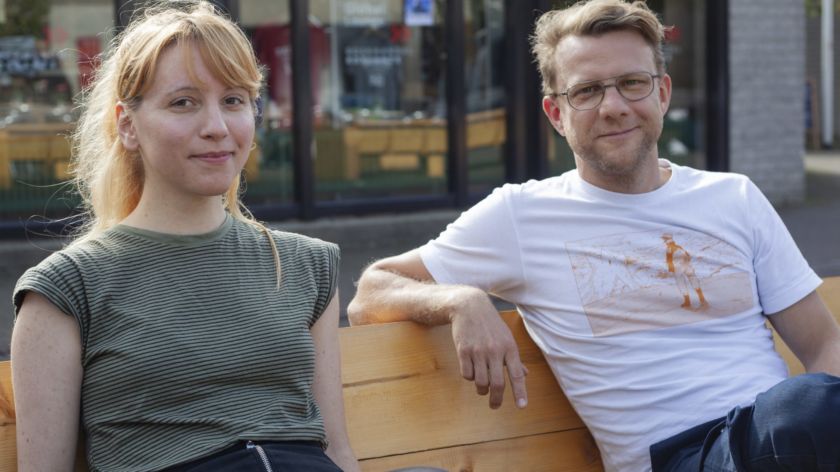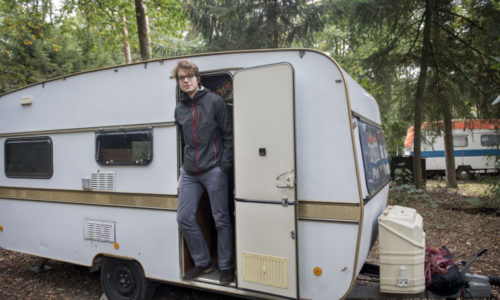Surfing friends’ couches for months
-
 Martina Valkovic and Dominik Formanowicz. Photo: Leoni Andriessen
Martina Valkovic and Dominik Formanowicz. Photo: Leoni Andriessen
Every international student knows at least one person on campus who has struggled with housing. Stories of students hopping from one friend’s place to another, paying horrific amounts of money for AirBnB’s, and the extensive stress caused by the housing situation are circulating around. Students Dominik Formanowicz and Martina Valkovic have experienced it themselves.
In Dominik Formanowicz’s and Martina Valkovic’s experience, it is really hard to find a house in Nijmegen when you are an international student. Formanowicz even had to opt for an AirBnB, which he claims is inefficient, unfair, and expensive. ‘There were a lot of strange rules,’ he says. He was only allowed to enter through the back entrance, he could not eat in certain areas, and the price was simply unrealistic for a person on a student budget. Hostels were another option, but there is an evident lack of them in Nijmegen. The last resort, finally, would be to broaden the map and look at neighbouring areas, but foreign students do not receive the studentenreisproduct, otherwise known as the travel discount for students.
‘A lot of landlords don’t want to rent to internationals, or students at all.’
Most students, especially internationals, go to SSH& – the housing company which collaborates with the university. However, first-year students receive the standard temporary contract of only one year. After their first year, they are able to apply for a waiting list for certain housing complexes, ‘but it is a non-transparent waiting list and there is no guarantee you will get a place.’ Valkovic says. Furthermore, the process can be very slow and both Valkovic and Formanowicz suspect it is due to a lack of rooms.
Dirty clothes
‘They assume you have enough contacts after your first year’, Formanowicz says. ‘But when you’re an international, it is hard to mix with Dutch students. On top of that, most of us are not in the country during the summer.’ This puts a strain on students’ ability to go to housing interviews or visits. Valkovic actually was in the Netherlands last summer. ‘I was refreshing websites and Facebook groups over and over again,’ which was an unnecessary, added weight and distraction when she was supposed to be writing essays.
Dominik adds: ‘a lot of landlords don’t want to rent to internationals, or students at all.’ Dominik was offered a room for a month, yet once the landlord learned he was an international, the offer was withdrawn. Martina agrees, recalling how her friend, who lived in the student house she was applying for, told her that she was not chosen because her roommates preferred Dutch students. ‘I don’t think it’s malicious, or that they had bad intentions. It’s just more convenient for them.’
To add to the problem, landlords sometimes take advantage of the lack of information international students have. ‘Since we’re new, we don’t know what to expect or demand.’ Many student housings do not offer a washing machine, or the landlord assigns a specific Laundromat, which will result in higher fees or having to wait until the dirty clothes pile up.
List of solutions
To solve her situation, Valkovic kept raising her budget and asking for help from her friends. ‘I had two friends who I stayed with for a week each,’ she recalls. ‘But now I’m staying at a place temporarily until January.’ For Formanowicz, a friend of his moved abroad for a while and he is staying at her apartment.
Both Valkovic and Formanowicz suspect that many international students are not informed about housing subsidies from the government either. These subsidies are available for Dutch and internationals alike, ‘and the international office never told us.’ Formanowicz adds. Valkovic nods, ‘at least then, you’d have more of an option because you’re not facing a €700 budget.’
‘I really wanted to stay here because I feel comfortable and at home in Nijmegen,’
Valkovic e-mailed her Faculty Dean for help. After that, she also made a list of solutions for the university. The list begins with the municipality; the university and the municipality should work together to coordinate the ever-growing number of students with the number of rooms, which seems to remain stagnant.
In her opinion, the length of the SSH& contract can contribute to the solution as well. She believes that if the contracts lasted for two years, it would give students a substantial amount of time to network and look for possible openings without having the add-on stress amidst the first year. Martina also thinks that the waiting list for SSH& housing should be more transparent, so students are aware of the probability of getting a place.
Comfortable
To better the relationship between landlords and internationals, Valkovic suggests the possibility of creating a university platform where landlords and students can place advertisements in a secure environment. Formanowicz adds: ‘the university can then check the conditions and rules so that everyone has the same standard contract.’
‘I really wanted to stay here because I feel comfortable and at home in Nijmegen,’ Valkovic recounts with a twinge of sadness in her voice. ‘When something like this happens, it reminds you that you’re foreign in a hurtful way.’ The university seems keen on promoting their diversity of students, which only invites more and more internationals each year. Yet, when the university makes it difficult for them to access basic needs such as shelter, it only discourages people from applying – or even continuing their studies at Radboud.
Extra
Vincent Buitenhuis, manager strategy & living of SSH&, acknowledges that the ‘short stay’ rooms are not ideal for students who stay for three years. ‘Until recently’, he says, ‘students who used these rooms were mostly exchange students or master students. Now, more and more students come for three years. But they get something that “regular” students do not get: the guarantee that they get a room.’ Because of tension on the housing market, regular students have to wait for up to 10 months to find a room, he says. ‘That is impossible for a student who comes from India, for example.’ Students who have to leave the room after a year, don’t end up on a waiting list, he says, but can apply for rooms and are granted one when they have the earliest application date. This is the date they first applied for a room at SSH&, so before they come to Nijmegen.
To solve these problems in the future, SSH& wants to build 900 new student rooms in the next eight years. The organisation also thinks about realising a new system to apply for rooms in the future.



Sandra schreef op 20 december 2018 om 00:00
Nice article
Lenny schreef op 23 december 2018 om 15:17
Nice article. Hope that the municipality can do something to help those students.